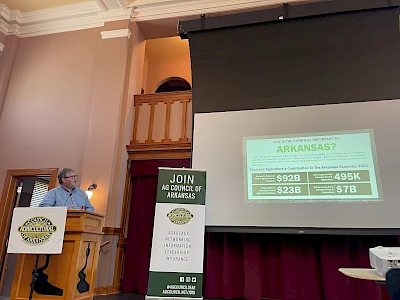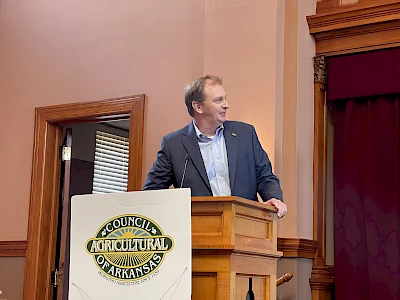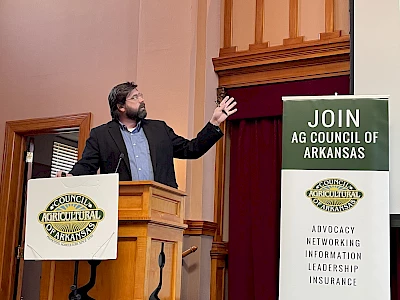On Tuesday, May 10th, the Board of Directors held a meeting in Helena, Arkansas. The meeting was an opportunity for members of the board to come together to share recent experiences with the 2022 growing season and to hear from guest speakers who addressed important issues facing Arkansas farmers and the agriculture industry. Guest speakers included Fitzhugh Elder, Republican Staff Director for the U.S. Senate Agriculture Committee under Senator John Boozman (R-AR); Scott Stiles, Economist with the University of Arkansas System Extension Service; and Harrison Pittman of the National Ag Law Center.
Following the presentations and lunch, attendees were able to take part in a tour of the Delta Dirt Distillery on Cherry Street in downtown Helena. We thank Nutrien for sponsoring the meeting and the meal provided to attendees.
More below:
Meeting Summary
Fitzhugh Elder Slide Presentation

Fitzhugh Elder, who works as Agriculture Committee Republican Staff Director for Ranking Member John Boozman (R-AR), traveled from Washington, D.C., to discuss the important role Senator Boozman has as Vice Chairman of the Senate Agriculture Committee. His presentation provided an overview of the composition of the Committee and the role of Senator Boozman and his committee staff in handling a range of policies impacting agriculture and rural communities and industries.
Mr. Elder spoke to the importance of agriculture to the state of Arkansas and Senator Boozman's commitment to support the state's leading industry through his seniority and positions in Congress. He offered a glimpse into the processes by which the next farm bill will be developed and the role Senator Boozman will play as Ranking Member or Chairman of the Committee. The next farm bill is scheduled to be reauthorized following the 2023 crop year.
In addition, Mr. Elder spoke of some of Senator Boozman's priorities for the next farm bill, which include the following principles:
-Farm focused
-Farmer informed
-Providing economic viability for farmers
Mr. Elder noted that the Senator would like to see the following outcomes from the next farm bill:
-Retention of a solid and reliable safety-net and risk management system (build upon the existing structure)
-Programs that can be workable for USDA under direction from Congress
-A bill that is an evolution of policy rather than an extreme departure from current structure
-Programs that are both efficient and effective
-Conservation programs that support working farmlands and are voluntary and incentive-based
Mr. Elder explained the Senator's position on the Appropriations Committee and the Environment and Public Works (EPW) Committee and the roles they play in helping to direct federal funds to Arkansas and the oversight roles they provide government-wide, but especially the Environmental Protection Agency (EPA). These positions, along with his leadership post on the Agriculture Committee give Senator Boozman substantial influence on policies impacting agriculture.
He thanked the Ag Council for their engagement with Senator Boozman and the Ag Committee, including recent testimony from Ag Council President John King III to Republican members of the committee during a recent roundtable discussion. In closing, Mr. Elder stated that farm bill hearings were beginning, and Senator Boozman was planning an Arkansas field hearing later this summer.
Before closing, Mr. Elder addressed the ongoing challenges resulting from the Russian invasion of Ukraine. He informed attendees that Congress was considering policies related to the resulting crisis, including efforts to bolster supply of food and agriculture commodities. He expected bipartisan legislation addressing the military and humanitarian needs in the coming days.
Scott Stiles Slide Presentation

Scott Stiles, an economist with the Univesity of Arkansas System Division of Agriculture Extension Service, provided an overview of economic factors facing farmers. His presentation focused on commodity and input price trends, market drivers for commodities and inputs, and a market outlook for the industry.
He focused on the current commodity markets, which have reached high levels that have not been met since the 2011 crop year. The unfortunate side of the equation is that inputs are also seeing record high prices across the board. He highlighted a few of the drivers of this run-up in prices, with much of the focus on the Russian war against Ukraine, which has rattled all markets.
Fertilizer costs, diesel costs, seed costs, and crop chemistry costs are all cutting into margins for farmers. Thankfully the commodity market prices are high enough to absorb some of these costs, but the pressure to produce a crop is much greater due to the risks assumed by the farmer.
Weather continues to play a role in the markets. It's delayed planting in Arkansas with a wet spring, but thankfully the rain has slowed and allowed planting progress to resume. Droughts in Texas and parts of the Midwest resemble 2011-2012, and could have an impact on ag commodity markets. The global weather patterns could set up for the drought to expand into Arkansas in the summer months, which could present greater risks for Arkansas farmers. The upper Midwest is also behind its planting due to wetter weather.
South American soybean production is down substantially year to year. Soybean acres in the U.S. are expected to exceed corn acres, which is very unusual, but that's driven by ag commodity prices, weather, and higher input costs required for corn.
With cotton, Stiles indicated that prices are expected to remain strong. Drought throughout much of the cotton belt could affect production, there are many similarities to the 2011 crop year with regard to drought in Texas, which could lead to a high level of abandonment.
Stiles encouraged farmers to focus on the areas they have the greatest control and avoid repeating any mistakes of the past, particularly as it relates to counterparties who may take possession or purchase crops. He urged consideration of controlling basis costs where possible and encouraged taking advantages of marketing opportunities that may present in the coming weeks for both the 2022 and 2023 marketing years. In addition, he encouraged farmers to be wary of interest rates and borrowing challenges that may be on the horizon.
Harrison Pittman Slide Presentation

Harrison Pittman, the director of the National Ag Law Center, joined as a guest speaker to provide a presentation focused on crop protection products and the ongoing challenges facing the supply and uses of such products due to administrative rules and regulations and potential actions of the U.S. courts.
Before diving into the subject matter, Mr. Pittman highlighted the new Fancher Research Fellowship Program established by the Law Center to aid in the development of future leaders in agricultural law and the row crop industry. He encouraged support for the initiative from members of the Ag Council.
Mr. Pittman described the situation around crop protection products as a "litigation battleground." In his view the field has shifted greatly in recent years due to actions of environmental organizations, their legal formations, and pressures from consumers. As a result of legal cases in federal courts, several policy changes have arisen at the federal label. Most notably is action taken by the Biden Administration to change the processes for registering crop protection products under the Federal Insecticide and Rodenticide Act (FIFRA) as it relates to the Endangered Species Act (ESA).
He mentioned ongoing issues facing key products including glyphosate, paraquat, chlorpyrifos, dicamba and enlist among others. Most of these are directly impacted by a new EPA process established earlier this year that will significantly change the consultation procedures when considering a registration or re-registration of pesticide active ingredients. The new process will likely lead to more thorough reviews from the U.S. FIsh and Wildlife Service and the National Marine Fisheries Service (Services) following any findings of potential adverse effects on threatened or endangered species or their habitats. The Services would be required to form a biological opinion (BiOp) that determines the potential effect on listed species of concern.
This process could prove time consuming and lead to more outcomes of limited uses or prohibited uses of products under review for use. Pittman encouraged the Ag Council to continue to be engaged on these issues as they carry major ramifications for how people farm in the future. He closed by stating the issue would continue to be in flux depending on Congress, administrations, or court actions.
Delta Dirt Distillery Tour

Following the lunch provided by Nutrien, attendees took part in a tour of nearby Delta Dirt Distillery on Cherry Street in downtown Helena. The distillery opened in 2019 and they have a tasting room and bar in the front room with the processing taking place in the rear. Harvey Williams, Jr., (pictured) provided a walkthrough tour of his distillery where he makes Vodka and Gin from corn and sweet potatoes. The distillery recently was recognized with a Double Gold award at the San Fransisco World Spririts Competition for its Sweet Blend Vodka.
Mr. Williams runs the business with his family, which also operates a farm in the area. They plan to launch a bourbon in the coming years, and they are quickly expanding their production and distributions channels as their business continues to grow.
Read more about Mr. Williams and Delta Dirt Distillery here: https://www.arkansasonline.com/news/2022/may/01/harvey-lee-williams-jr/?features-profiles
The next meeting of the board of directors will be August 18th in Jonesboro at the ASU Embassy Suites Convention Center.
